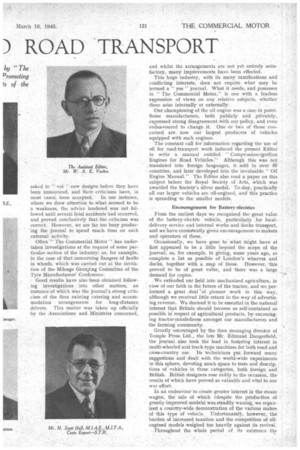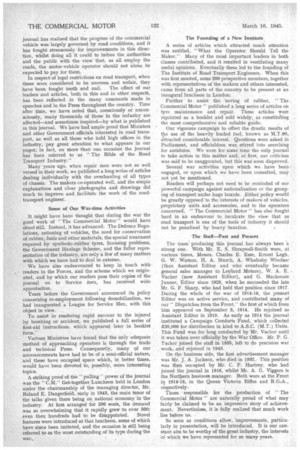) ROAD TRANSPORT
Page 32

Page 33

If you've noticed an error in this article please click here to report it so we can fix it.
asked to " vet " new designs before they have been announced, and their criticisms have, in most cases, been accepted. In one instance, where. we drew attention to what seemed to be a weakness, the advice tendered was not followed until several fatal accidents had occurred, and proved conclusively that the criticism was correct. However, we are far toobusy producing the journal to spend much. time on such external activity.
Often " The Commercial Motor" has undertaken investigations at the request of some particular section of the industry; as, for example, in the case of that concerning aangers of faults in wheels, which was carried out at the invitation of the Mileage Grouping Committee of the Tyre Manufacturers' Conference.
Good results have also been obtained following investigations into other matters, an instance of which was the journal's strong criticism of the then existing catering and accommodation arrangements for long-distance drivers. This matter was taken up officially by the Associations and..Ministries concerned, and whilst the arrangements are not yet entirely satisfactory, many improvements have been effected.
This huge industry, with its many ramifications and. conflicting interests, • does not require what may be termed a "yes "journal. What it needs, and possesses in " The Commercial Motor," is one with a fearless expression of views on any relative su•bjects, whether these arise internally or externally.
OUT championing of the oil engine was a case in point. Sonic manufacturers, both publicly and privately, expressed strong disagreement with our policy, and even endeavoured to change it. One or two of those concerned are now our largest producers of vehicles equipped with such engines.
The constant call for information regarding the use of oil for road-transport work induced the present Editor to write a manual entitled " Compression-ignition Engines for Road Vehicles." Although this was not ..translated into foreign languages, it sold in over 50 countries, and later developed into the invaluable " Oil Engine Manual." The Editor also read a paper on this subject before the Royal Society of Arts, which was awarded the Society's silver medal. To-day, practically all our larger vehicles are oil-engined, and this practice is spreading to the smaller models.
• Encouragement for Battery-eiectrics From the earliest days we recognized the great value of the battery-electric vehicle, particularly for localdelivery service and internal works and docks transport, and we have consistently given encouragement to makers and operators of these.
Occasionally, we have gone to what might have at first appeared to be a little beyond the scope of the journal, as, for example, in giving, some years ago, as complete a list as possible of London's wharves and docks, together with a map of these. However, this proved to be of great value, and there was a large demand for copies. We extended our field into mechanized agriculture, in view of our faith in the future of the tractor, and we performed a great deal 'of pioneer work in this way, although we received little return in the way of advertising revenue. We deemed it to be essential in the national interest that Britain should become as self-contained as possible in respect of agricultural products, by encouraging tractor-mindedness amongst our manufacturers and the farming community.
Greatly encouraged by the then managing director of Temple Press Ltd., the late Mr. Edmund Dangerfield; the journal also took the lead in fostering interest .in multi-wheeled and track-type machines for both road and cross-country use, Its technicians put forward many suggestions anddealt with the world-wide experiments in this sphere, devoting much space to tests and descriptions of vehicles in these categories, both foreign and British. British designers rose nobly to the occasion, the results of which have proved so valuable and vital to our war effort.
In an endeavour to create greater interest in the steam wagon, the sale of which (despite the production of greatly improved models) was steadily waning, we organized a country-wide demonstration of the various makes of this type of vehicle., Unfortunatel'y, however, theburden. of increased taxation and the competition of oilengined models weighed too heavily against its revival.
.Throughout the whole period of its existence the
journal has realized that the progress of the commercial vehicle was largely governed by road conditions, and it has fought strenuously for improvements in this direction, whilst doing all it could to imbue the _authorities and the public with the view that, as all employ the roads, the motor-vehicle operator should not alone be expected to pay for -them.
In respect of legal restrictions on road transport, when these were considered to be onerous and unfair, they have been fought tooth and nail. The effect of our leaders and articles, both in this and in other respect, has been reflected in the many comments made in speeches and in the Press throughout the country. Time after time, we have noted that, consciously or unconsciously, many thousands of those in the industry are affected—and sometimes inspired—by what is published in this journal. We have had ample proof that Ministers and other Government officials interested in road transport, as well as all those who hold high offices in the industry, pay great attention to what appears in our pages; in fact, on more than one occasion the journal has been referred to as "The Bible of the Road Transport Industry."
Many 'years ago, when repair men were not so well versed in their work, we published a long series of articles dealing individually with the overhauling of all types of chassis. The makers co-operated well, and the simple explanations and clear photographs and drawings did much to improve and facilitate the work of the roadtransport engineer.
Some of Our War-time Activities It might have been thought that during the war the good work of "The Commercial Motor" would have stood still. Instead, it has advanced. The Defence Regulations, rationing of vehicles, the need for conservation of rubber, fuels and other materials, the special treatment required by synthetic-rubber tyres, licensing problems, the Government Haulage Scheme, and the fuller representation of the industry, are only a few of many matters with which we have had to deal in extenso.
We have also endeavoured to keep in touch with • readers in the Forces, and the scheme which we originated, and by which our readers pass their copies of the journal on to Service men, has received wide approbation. Years before the Government announced its policy concerning re-employment following demobilization, we had inaugurated a League for Service Men, with this object in view. .
To assist in rendering rapid succour to the injured by bombing or accident, we published a full series of first-aid instructions, which appeared later in booklet form.'
Various Ministries have found that the only adequate method of approaching operators is through the trade and technical Press. Consequently, many of our announcements have had to be of a semi-official nature, and these have occupied space which, in better times, would have been devoted to, possibly, more interesting topics.
A striking proof of the " pulling " power of the journal was the " C.M." Get-together Luncheon held in London under the chairmanship of the managing director, Mr. Roland E. Dangerfielcl, early in 1943, the main tenor of the talks given there being on national economy in the industry. At first arranged. for 200 seats, the demand was so overwhelming that it rapidly grew to over 500; even then hundreds had to be disappointed. Novel features were introduced at that luncheon, some of which have since been imitated, and the occasion is still being referred to as the most outstanding of its type during the war.,
The Founding of a New Institute A series of articles which attracted much attention was entitled, "What the Operator Should Tell the Maker." Many of the most important leaders in both Classes contributed, and it resulted in ventilating many useful opinions. Eventually these led to the founding of The Institute of Road Transport Engineers. When this was first mooted, some 200 prospective members, together with representatives of the makers and others interested, came from all parts of the country to be present at an inaugural luncheon in London.
Further to assist the 'saving of rubber, "The . Commercial Motor" published a long series of articles on tyre maintenance and repair. These articles were reprinted as a booklet and sold widely, as constittaing the most comprehensive and reliable guide: Our vigorous campaign to offset the drastic results of the use of the heavily leaded fuel, known as M.T.80, attracted considerable interest. Questions were asked in Parliament, and officialdom was stirred into searching for antidotes. We were for some time the only journal to take action in this matter and, at first, our criticism was said to be exaggerated, but this was soon disproved.
Several war activities upon which we have been engaged, or upon which we have been consulted, may not yet be mentioned.
Readers will perhaps not need to be reminded of our powerful campaign against nationalization or the grouping of transport under huge boards. ,Eithet policy would be greatly opposed to the interests of makers of vehicles, proprietary units and accessories, and to the operators concerned. "The Commercial Motor" has also fought hard in an endeavour to inculcate the view that as road transport is one of the tools of industry it should not be penalized by heavy taxation.
The Staff—Past and Present The team producing this journal has always been a strong one. With Mr. E. S. Shrapnell-Smith were, at various times, Messrs. Charles E. Esse, Ernest Legh, G. W. Watson, H. A. Starch, A. Whalesby Windsor (then Assistant Editor and who eventually became general sales manager to Leyland Motors), W. A. E.
Vacher (now Assistant Editor), and G. Mackenzie junner, Editor sinoe 1929, when he succeeded the late Mr. G. F. Sharp, who had held that position since 1917.
During the whole of the war of 1914-18, the present Editor was on active service, and contributed many of our" Dispatches from the Front," the first of which from him appeared on September 3, 1914. He rejoined as Assistant Editor in 1919. As early as 1914 the journal instituted a Campaign Comforts Fund, which collected £20,000 for distribution in kind to A.S.C. (M.T.) Units. This Fund was for long conducted by Mr. Vacher until it was taken over officially by the War Office. MT. P. G. Tucker joined the staff in 1935, left to do precision war work, and rejoined in 1943.
On the business side, the first advertisement manager was Mr. J. A. Jackson, who died in 1932.. This position was then occupied by Mr. C. P. Hartrey, who had joined the journal in 1916, whilst Mr. A. G. Viggers is the Northern business manager. Both were at the Front in 1914-18, in the Queen Victoria Rifles and R.G.A., respectively.
Those responsible for the production of "The Commercial Motor" are naturally proud of what may • fairly be claimed to be an impressive story of achievement. Nevertheless, it is fully realized that much work lies before us.
So soon as conditions allow, improvements, particularly in presentation, will be introduced. It is our constant aim to be worthy of the great industry, the interests of Which we have represented for so many years.



























































